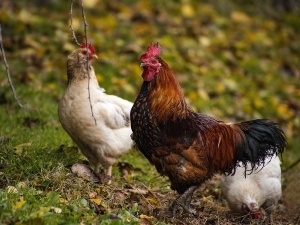
Chickens are not known to be sedentary animals, these birds are known to be active during the day. They keep themselves busy with activities like foraging and taking dust baths.
If you know your bird to be very active, and it suddenly stops being active, you’d understandably be worried. This article explores why this happens.
Table of Contents
Chicken bloated and lethargic:
Chickens can’t talk and communicate when something is wrong but we can tell when something is going on with our birds if they have a change in appearance and behavior.
If your bird is bloated and lethargic then this may be the issue:
Egg yolk peritonitis:
One reason why your bird may have a bloated stomach, and be lethargic, may be because the bird has egg yolk peritonitis. This condition can happen in laying hens and signs of this condition include a swollen-looking abdomen and lethargy.
Other symptoms of this condition in your bird include a lack of appetite, difficulty breathing, soft-shelled eggs being produced, misshapen eggs, or a lack of egg-laying altogether.
Causes:
Egg yolk peritonitis develops when a mishap happens when yolks are released.
Eggs start off as yolks in the bird’s body, these yolks are released by the bird’s ovary, this is the first step of egg production.
Once the yolk is released by the ovary, it moves into the oviduct, the yolk continues to develop into an egg while in the oviduct until it leaves the bird through the vent.
If there is a mishap, and the egg is not released into the oviduct, then the yolk will land in the bird’s abdominal cavity.
The egg yolk, when in the bird’s abdominal cavity will cause inflammation of the bird’s peritoneum (the membrane lining of the abdomen). This inflammation will make the bird’s abdomen look swollen.
What to do:
Egg yolk peritonitis is quite a serious condition, the best course of action would be to take your bird to a vet to be examined and diagnosed.
The vet will do a physical exam where they will use their finger to feel into the bird’s coelom and vent, the vet will feel for fluid, or soft-shelled eggs.
The vet will also run some blood tests to see if your bird has an infection. A high white blood cell count is a sign that your bird is trying to fight off an infection.
If your bird does have this condition then the bird will be given anti-inflammatory medications. If needed, your vet will also prescribe antibiotics, either oral or injectable, for the bird.
If needed, then the vet may have to perform surgery on the bird to treat the disease.
Ascites (Water belly):
If your bird’s heart works too much then heart failure can develop. Heart failure causes the liver to stop working properly.
A liver that does not work properly will leak fluids into the bird’s abdominal cavity causing “water belly”, this fluid in the abdominal cavity will make the bird look bloated.
Symptoms of water belly, apart from the bird having a bloated stomach and lethargy, include: a reduced appetite, respiratory distress, panting, blue wattles, blue combs, and slow growth.
Causes of water belly:
If your chicken is a rapidly growing breed of poultry, then the bird’s heart and lungs will become too stressed and won’t be able to keep up with the body’s fast growth, chickens in this scenario are more likely to develop water belly.
Too much stress on the heart and lungs will negatively affect how they deliver oxygen to the bird’s body. The heart and lungs will try to quickly and efficiently deliver oxygen and will work furiously to do this, but this will lead to heart failure.
In addition, if birds live on farms that are very high up, high enough where oxygen is lower, forcing the bird’s heart and lungs to work harder, then this condition can also develop.
Other reasons behind this disease include respiratory disease, which makes the lungs less effective, poor nutrition as well as poor genetics.
What to do:
If your chicken has water belly then your bird may need continuous treatment. The most effective cure would be to drain the bird’s body of the excess fluid in the abdomen. You, or your vet, can do this, but it is recommended that a vet do this.
Treating a bird that has water belly involves using a needle to pierce the bird’s abdomen and using a syringe to suck the fluid out of the bird’s abdomen.
The above treatment may help but unfortunately, it won’t permanently solve your bird’s fluid build-up problem, your bird will eventually build up more fluid that will need to be drained out again.
It is said that giving the bird oregano, vitamin C, flax oil, and brewers yeast can help with this ailment, but these are not permanent solutions either.
If you enjoyed this article then you may also be interested in other chicken related articles. Here are some articles that you may be interested in: Dead Chick In Incubator, Lethargic Chicken With A Dirty Vent, Vent Gleet Or Egg Bound, Chicken Swollen Below Vent, Swollen Chicken Vent

